Make money blogging with these easy affiliate programs for book bloggers (that aren’t all books!). Then, keep reading for tips on how to correctly and legally use affiliate links that will convert to sales. Best practices included!
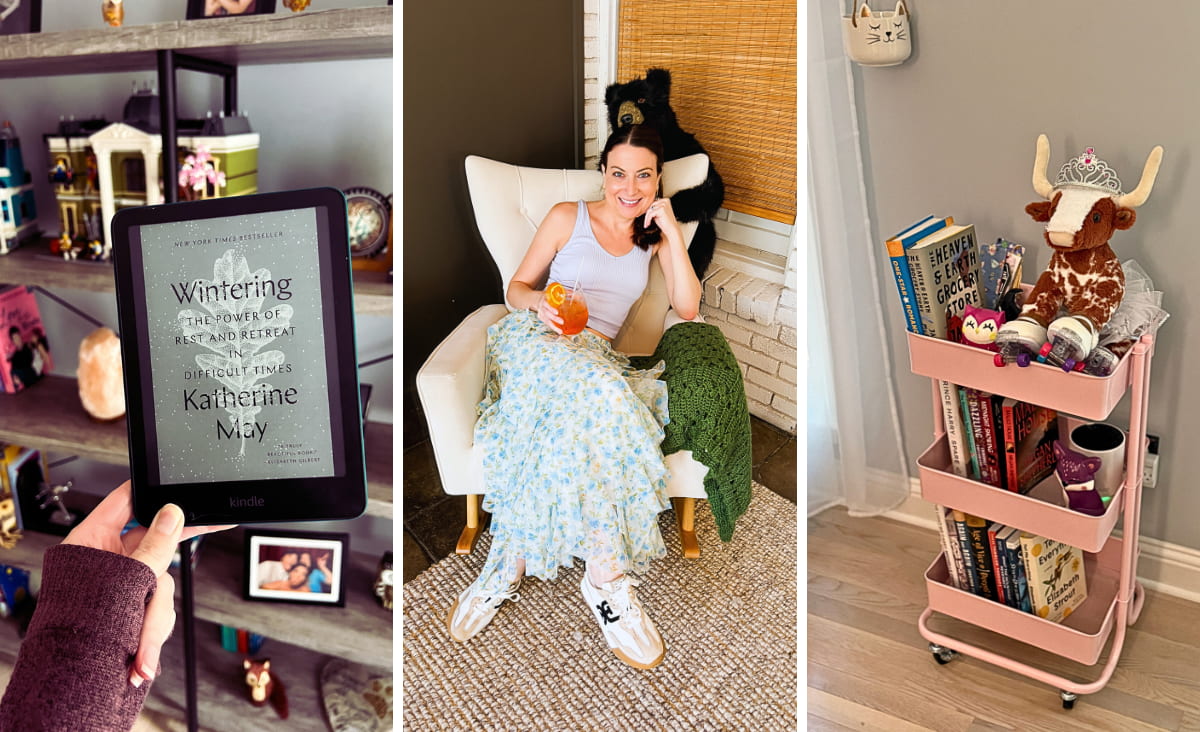
Book blogging takes time and effort. You deserve to get paid for your hard work and excellent, authentic content. Affiliate programs are a great way to do this with a benefit to your audience. It’s a win-win all around. Here’s how. 💜 Christine
4 Best Affiliate Programs For Book Bloggers
My book blog/online literary magazine, The Uncorked Librarian, showcases books, movies, TV shows, podcasts, and travel that inspire wanderlust (these are some of my favorite book blog topics to write about).
As a seasoned career travel and book blogger since 2017, these are the highest paying, best converting, and most used affiliate programs not just for books, but also for travel and lifestyle. Along with display ads via Raptive (I started with Mediavine), affiliate marketing helped turn my hobby blog into a full-blown LLC and business.
Amazon Associates
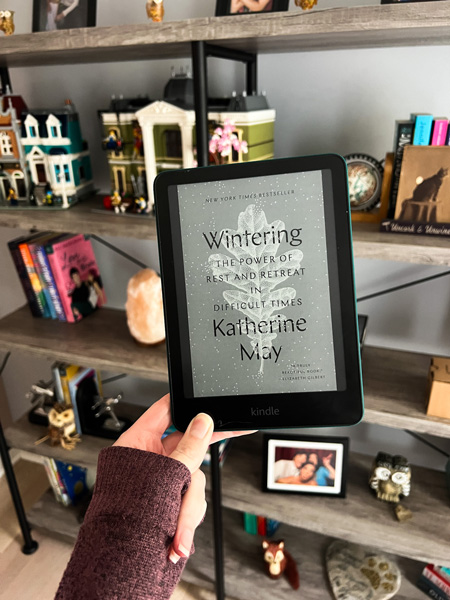
I first started monetizing my book blog with Amazon, and it is one of my best-paying affiliate programs as a book blogger. The program is easy to sign up for, and you can monetize via product affiliate links and the Amazon Influencer Program, including a Storefront (I need to beef up mine).
Amazon works best for me because not only do I earn a commission on that specific link – think a book title on a book list – but I also earn if my readers purchase other items during their allotted “cookie period.”
Amazon is also extremely versatile and pretty popular. Our household has a Prime membership that we honestly cannot live without; Amazon is convenient, cheaper than our store prices, and we can purchase things not readily available near us in the mountains. For bloggers – and shoppers – Amazon offers endless products related to lifestyle, fashion, gardening, books, movies, music, and more. Read about Amazon’s Affiliate Program here.
Tip: Don’t Go Overboard With Affiliate Programs
For me, it’s best to have the fewest number of affiliate programs possible because you have to monitor and update links as well as track when you get paid.
LTK (Formerly LiketoKnow.it)
I recently joined LTK, formerly LiketoKnow.it, wanting to add more lifestyle posts to my book blog. One of my good blogging friends earns over $80,000 a year largely through their affiliate program alone.
LTK is great if you have a dedicated social media presence, especially on Instagram and/or Pinterest. You do not need a large following, like you might expect, to convert sales. You do need authority and trust, though. Bloggers can also gain a following using their LTK app, a unique bonus with its own large audience.
While fashion and lifestyle do extremely well with LTK, for book affiliate programs, you can also use Amazon, Target, and Walmart. Apply to be an LTK Creator here. LTK has over 7,000 retailers to link to.
Skimlinks
Similar to LTK, I use Skimlinks as a catch-all for numerous book affiliate programs, including Libro.fm and Bookshop. For bloggers and content creators, Skimlinks partners with over 20,000 merchants, making this program a quick and easy way to monetize a plethora of products, brands, and business partners on your site.
I use a Chrome extension for both LTK and Skimlinks to create affiliate links. Personally, I prefer to individually place all my links versus having website coding automatically convert them for me. This is a personal preference, though. Apply to Skimlinks here.
Travelpayouts
I use Travelpayouts for both my travel and book blogs, which is great if you are adding any type of travel content to your blog. Travelpayouts has programs you can “apply” for within. I use them for Booking.com, Viator, GetYourGuide, rental car programs, and concert tickets. They have a variety of tools to help you monetize, including widgets, affiliate links, banners, a plugin, and a Chrome extension. Join Travelpayouts today.
How To Use/Link These Affiliate Programs On A Book Blog
While I occasionally use affiliate banners and widgets, affiliate links within blog posts and buttons are far more successful, especially when paired with a review of the product.
Example Of Affiliate Links On A Book List
For book lists and book reviews, this is one example of how I use the above book affiliate programs to monetize a blog post.
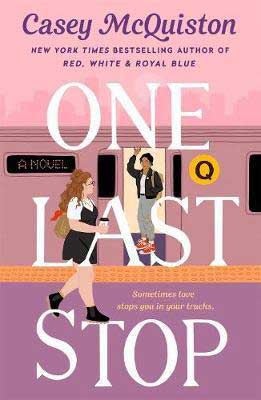
From bestselling author Casey McQuiston of Red, White, & Royal Blue – one of my favorite LGBTQ+ books of all time – you have to pick up One Last Stop if you enjoy books set on trains or time travel-themed plots.
Cynical August’s life changes when she meets a beautiful and mysterious woman trapped in a train’s energy. This feel-good story follows love across time and space, filled with lovable friends you’ll strive to make.
Read & Buy A Copy Here:
Using Banners & Widgets Example
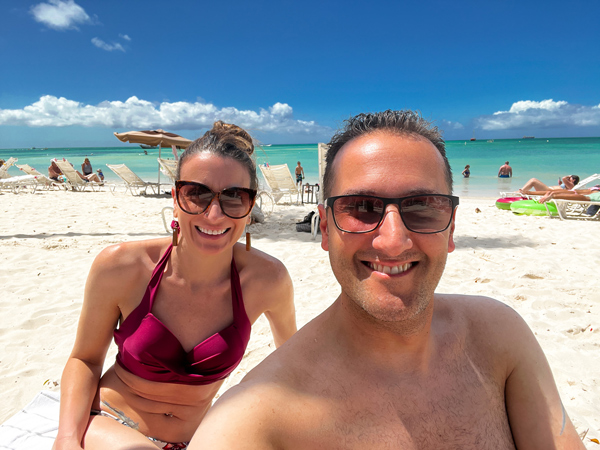

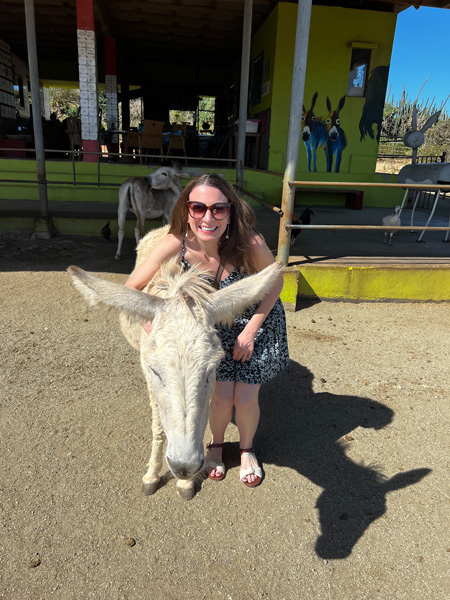

Having enjoyed our trip to Aruba, I wrote articles showcasing the highlights of our visit. This is an example of an affiliate widget with GetYourGuide via Travelpayouts that I might use on those travel posts:
Must-Know Legal Affiliate Marketing Tips For Book Bloggers
As a beginner book blogger, no one told me how to legally and ethically use affiliate links. You don’t want to get kicked out of an affiliate program, break FTC guidelines, or receive unseen penalties from search engines. This means properly disclosing affiliate links, marking links as “nofollow” and “sponsored,” and paying taxes on earned income. Quick tips:
Properly Disclose Affiliate Links
Far too often, I see book bloggers post affiliate links and disclose at the bottom of a blog post – or not disclose at all. Before your first blog/website affiliate link, you must tell readers that you are earning a commission from purchases.
Read these FTC guidelines before using affiliate links and doing any sponsored work. Proper disclosures and placements apply to social media platforms, too, and each affiliate program has its own requirements. Amazon requires additional phrasing.
Mark Links As “Nofollow” & “Sponsored” In Blog Posts
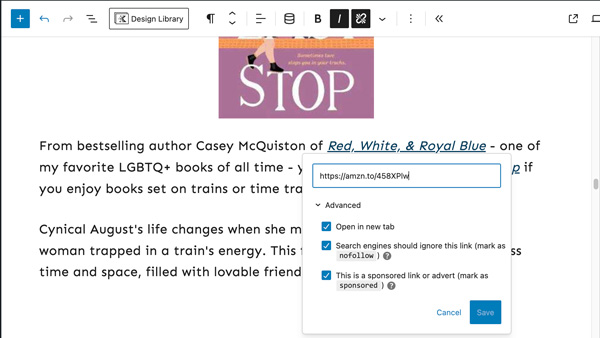
Google will penalize your website if it discovers you are promoting affiliate links and sponsored products/trips/anything without alerting its crawlers and readers. Any affiliate link must be designated as such. I blog in Wordpress (.org) using Kadence blocks. With my affiliate links, I check the boxes for “nofollow” and “sponsored.” Easy peasy. Takes a second.
Pay Your Taxes On Earned Income
In the U.S., if you earn over $400 from your book blog, you are no longer a “hobby blogger.” Research when and how to pay taxes. Seek professional help from an accountant/CPA.
Best Practices To Earn More
- Affiliate links work better than widgets and banners
- Check your links or use a link checker plugin to ensure you don’t have bad links, 404s, etc. on your website
- Links closer to the top of a blog post (or even in a newsletter) receive more clicks
- Disclose, Disclose, Disclose – you may never get caught not properly disclosing, but be ethical and keep your reader’s trust. People can report you to the FTC, too. If a restaurant owner gives me a free dessert while I’m there on my own time to say thank you for years of freely showcasing their restaurant on my website, I still tell my readers that specific dessert was kindly given to me for free (even unsolicited), if I share it anywhere (IG stories, a Facebook post, you name)
Legal Resources For Monetized Book Bloggers
If you use affiliate marketing, ads, sponsorships, etc. for your book blog, I highly recommend these resources:
👩🏻💻 Legal Bundle (this is a must; legal pages at the bottom of your website written by a lawyer and 6-figure blogger)
👩🏻💻 Affiliate Agreement
👩🏻💻 Sponsored Posts Agreement
👩🏻💻 Freelancer Contract (I use this for my writing contributors and when people ask me to freelance for them)
👩🏻💻 LLC Operating Agreement – This 11-page document legitimizes your business, separating your blog from personal assets like your (personal) bank account, car, and house.
Before You Go: What To Read & Do Next
Try using what you learned from this blog post with any of these great book blogging topics:
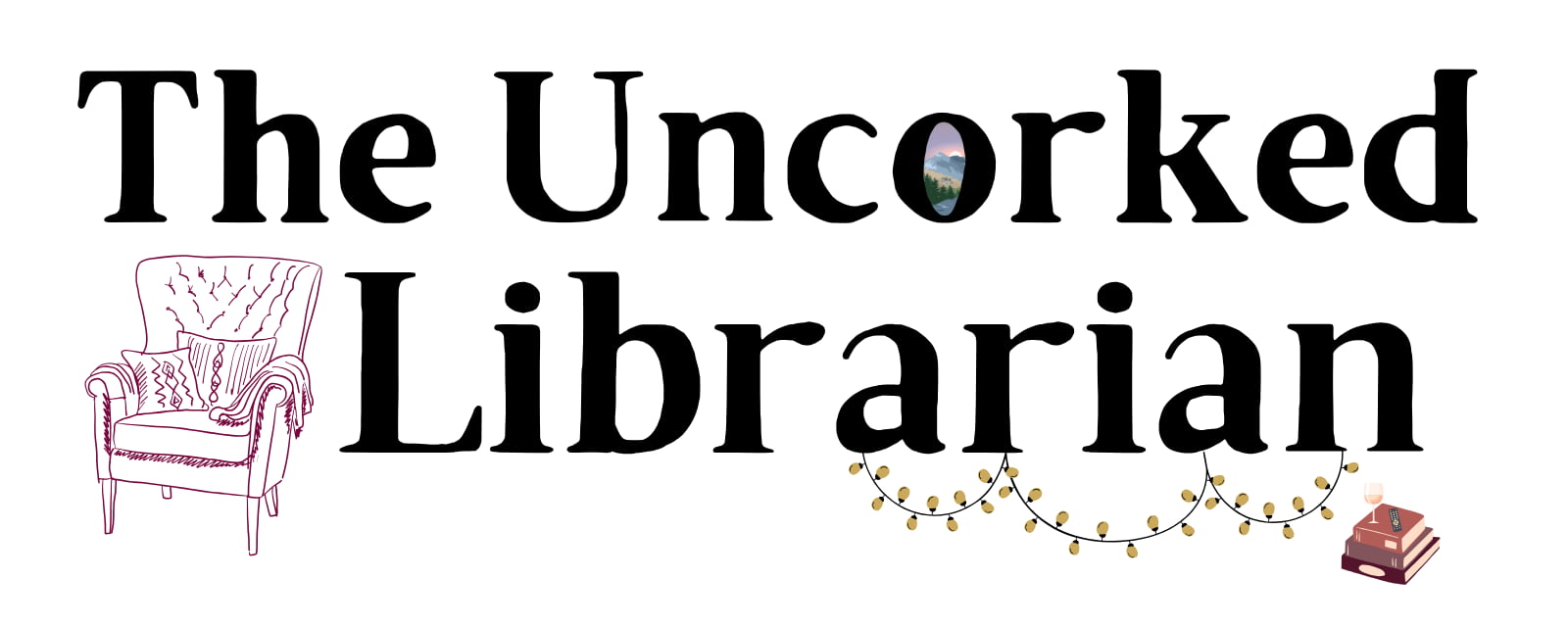

I found this post super helpful as I’m looking at signing up to be an affiliate. I do have a question, though…my blog isn’t “officially” an LLC or a business or anything, so I feel weird signing up as though it is. Can you point me to any place that gives advice on how to go through proper channels for that? Or do you have any advice from your personal experience? Thanks in advance!
Hey Christina,
Thank you!
So, you don’t have to have an LLC or a ‘business’ to apply to be an affiliate for the above programs. You would just apply with your blog as is — many people do that. The only thing that you have to keep in mind is paying your taxes on that affiliate income if it’s over a certain threshold (usually $400 if you live in the U.S.).
I have a post that talks about LLC for blogs here: https://www.theuncorkedlibrarian.com/turning-your-blog-into-a-business/. (Please just remember that I’m not a professional, and this is all my experience and opinion.) I hope this helps! I try to update both articles every year.
Hi Christine! If you ever do another update of this article, would you consider adding my bookshop’s affiliate program? My name is Nyasha Bryant and I own the online, independent bookshop called missreadbooks.org. It’s geared towards BIPOC women and non-binary folk who enjoy empowering, magical, and adventurous books. I would absolutely love to spread the word about my shop’s affiliate program. Commission is 5% and the discount code is 15%, similar to the Book Depository.
Hi Nyasha,
I approved this comment but removed your more private contact information (email address) so that our readers may check out your book affiliate program at their leisure/discretion and contact you via your website. Thank you for letting us know! We appreciate it!
wow so glad I read this lol I’m currently having the same “schmuck” feelings that you had! thanks for the info!
Haha. Blogging is definitely a learning curve. You are so welcome!
Hi
I am sooo happy I stumbled upon your page,
What a great post.
I am so new at this, I have only started my website a few weeks ago through a course, and I was not aware of the disclosures having to be at the beginning.
Thank you so much for sharing your experiences.
All the best Colette
Hey Colette. Thanks so much! Yes, disclosures are incredibly important as part of following FTC guidelines and ethical blogging and social media practices. There’s definitely a lot to learn about blogging legally — it’s tricky. Nofollow and sponsored links are important, too.
I’m definitely on the fence about switching my blog over to a fully hosted one since mine is a wp.com right now. And I’m not about to pay the $300/year in order to put up affiliate links! But I will miss the community aspect of wp.com!
It depends on what your goals are (to make money, have readers, etc), but basic blogging 101 is going self-hosted. Imagine if every full-time, side-hustle, or 6-figure blogger said they didn’t want to pay $300 to host a year.
It’s like saying that you are starting an ice cream shop but don’t want to pay rent for your shop, buy ingredients to make the ice cream, or scoops to scoop it out. If you want to make money blogging (big or small), you have to treat your blog like a business and invest in it and yourself. If you are just blogging for a hobby and don’t care if anyone reads it/don’t want to make a cent, then that is different (but this is a post about how to make money book blogging).
You will still have a community self-hosting. People can comment, sign-up for a newsletter, join a FB group you’ve created, follow on social media… I have a huge and engaged community as a book blogger. My experience with WP .com is that it basically creates a false community of bloggers follow for follow-ing other bloggers. It’s unlikely your true target audience and readers live on WP .com unless you are only targeting other novice/hobby bloggers. There is nothing in the ‘reader’ that you can’t replicate via an RSS, newsletter, SM, or just visiting your favorite blogs.
I just stumbled across this post. I have been researching book affiliate programs. I share so many recommendations, more on instagram than on my actual blog, but was hoping to affiliate myself with one. I signed up for Book Depository a while back and that hasn’t yielded anything. I was keen to learn about the Amazon affiliate program, but if they are restricting friends etc, wouldn’t it be hard to do?
Do the affiliate links have to be posted on the blog? Or is instagram ok?
I don’t really use Book Depository much anymore since after hosting a book blog for two years, all of my readers seem to prefer Amazon. I dropped Barnes and Noble, too, since my readers were never buying from them.
Most of my friends and family don’t follow my book blog so as long as your blog/SM has a target audience (which honestly shouldn’t be your friends if you are trying to make money from it, have a side hustle, or are a part or full-time blogger), you should be able to easily make a little affiliate income from Amazon’s program.
I wouldn’t personally post affiliate links on IG (and you would need to double-check where you allowed to post affiliate links per program – not all let you post on social media and/or you have to add that site into your approvals; plus you would need to fully disclose in front of that link) — as I don’t see a ton of click-throughs on IG, even to the blog. I know that you can do Amazon links on FB, but again, for me, that isn’t a strong place to market them. You really need an invested audience, and for me, my readers invest on my blog first. Most people go on IG to look at pretty pictures, get information, and occasionally purchase (but not from Amazon). At least that’s my personal experience.
This was really helpful I’ve only been blogging for a few weeks and am just starting to add in affiliate links into the few posts I have on my site.
I didn’t get accepted by Amazon due to not having enough on my blog but I did get Whsmith and Book Depository.
I have a few followers on insta already just by following a few people.
I can already see that book blogging is a community 1 following on insta got me about 4 followers.
I’m also using site ground land wordpress and after having a few problems setting up I’m now getting into it and about to start advertising my blog more.
Hey Tianna, I am so glad that this book blogging affiliate post was helpful for you. You can always re-apply for Amazon when you start having more blog posts and traffic. It’s exciting to watch your social media accounts and blog slowly grow–enjoy every second and best of luck to you. SiteGround is the best–I love them and highly recommend them. I’ve been with them for years. I love book blogging, and I hope you will love it too. Thanks so much for stopping by and letting me know.
This is so helpful! I’m new to this blogging gig and it can be a bit overwhelming trying to figure it out!
Thank you! I definitely hope that this list/guide helps. Blogging takes a lot of time to learn everything–it is SO overwhelming at times. I feel ya! It’s totally worth it in the end. Never hesitate to ask if you have any questions.
You are the BEST!! I was just talking to my husband (aka, my IT department) about how I think I’m ready to start monetizing my blog. Just to see how it goes! But, it is overwhelming when it comes to picking a place to start. I’ve done some research here and there, but this post really helped give good details about programs, especially for us book bloggers. Thank you so much for all this info!!! It’s a great starting point.
Out of curiousity — do you know anything about how paying taxes on blog income works? I used to do freelance work, and the paperwork needed to file for “freelance” or “home business” taxes is brutally expensive. This is one of the reasons I’ve been reluctant to start monetizing; I don’t wanna pay $300 for paperwork for my business that’s only bringing in $3 a month, lol. I always see so much about making money from blogs — but not about how to handle taxes! If you know of any good place for info on that, I would be grateful for the links! 🙂 Thanks!
Thank you so much! It is so overwhelming–I am not going to lie. I did A LOT of research, and I have been trying new tactics. I also started taking more online courses and watching youtube videos. I am glad that you found this helpful.
So if you are a freelancer, you know about self-employment taxes and reporting, which I am just learning. This is how I became a LLC: https://www.theuncorkedlibrarian.com/turning-your-blog-into-a-business. As you probably know, a single member LLC operates like a freelancer but you have different asset protection (or so a casual lawyer told me). The only real difference is that someone would sue my blog and not me. The $300+ in paperwork is worth it for me because I don’t want to get personally in trouble because I thought I had permission to use a book cover when I didn’t…or something like that. Leave my wine fund alone! If you make more than $400ish (don’t quote me–I am not a professional tax person or lawyer), than you went from hobby to business and officially have to pay taxes. Most of these affiliates ask for a W-9. They track a lot for you too. To be safe, my husband bought Turbo Tax for small business this coming year. I’ll let you know if it was the right choice. I am still trying to figure out all of the taxes, honestly. I just started making money and fully using these affiliates. I have Excel sheets with expenses and income. If I make more (which I haven’t but hope to next year), I’d honestly go see an accountant or at least call my local business resource center to make sure that I am doing taxes 200% correctly. Hope that helps! I’ll keep you up to date as I learn.
This definitely helps a lot! Thank you for sharing all these candid details. Also helps to know that the general “hobby” threshold is around $400. I saw your other comment above about how much you actually had to invest into the blog before being able to start trying to make money (LLC, etc). That is crazy, and all that stuff never even occured to me. I never seem to think of this as “this is starting a business”; it’s always “this is a hobby that may bring in extra cash!” But the former is a reality, and one I definitely need to do a lot of research in before I decide I’m ready to jump in. Thanks again for sharing all your experiences thus far!!
No problem! I think that you can definitely turn your blog into a little side hustle without too much worry. There are plenty of bloggers who don’t go LLC yet bring in minor affiliate income. I am going to look at selling courses, books, and products–so for me, LLC status made sense to jump right on board as a business. Honestly, the expense also motivates me to make all of it back ASAP. You can probably be OK just monetizing with links by making extra sure to have solid Privacy and Disclosure Policies, etc. You could seek some free volunteer lawyer advice in FB groups and such.
Great breakdown of .com vs .org! We’re so glad we went with .org and self hosting. It makes a world of difference!
Need to check out ShareASale. Not that we’re anywhere else to being able to monetise since our page/site views are still abysmally low. Oh, but one day… *sigh*
And yeah, Amazon is insanely strict. I find it so ridiculous that you might be penalised for a friend or family member seeing something you advertise and GENUINELY wanting to buy it. So long as it’s not you (which some affiliates allow, but I can understand why they wouldn’t), honestly don’t get why it’s such a big deal. Especially since everyone complains how low Amazon’s commission is, as well! Still, we endure…
Thank you!
I needed that .com vs .org lecture long before I wasted some cash on themes for the wrong platform. WP .com asks why you are leaving, and the answer is DUH….they really do have false advertising. You can’t truly monetize with .com, even though they pretend that you can.
I first started with ShareASale because of Tailwind–which has tenfold made a difference in my blogging traffic. My page views are slowly getting up there. I’d love to be at 10,000 a month before Dec. I’m learning that I do have to write more posts that sell for my audience.
Commission cracks me up sometimes. Someone used my Barnes and Noble affiliate links for almost $50 in books; I received 48 cents. I just got 4 cents off of an ebook sale on Amazon. I am still hoping to master affiliate marketing as passive income. Bloggers make $1,000 a month from it alone, if not more. It’s wild. I need to organize my affiliates. I recently started applying for everyone–indiv. programs payout more.
I just starting using Amazon Affiliates but don’t really know if I’ll get anything out of it just yet (I just joined because I saw you do it and it’s free) – I really need to read up on it more I think! Great advice about Wordpress I will also look into that too. I really want to make my site more professional but feel like I can’t start anything until I’m earning a full-time wage. Its all excuses, I’m scared to commit after my travel one failed!
I literally just got paid out by Amazon today…I calculated how much they made in four months vs me. Then I laugh-cried. GAHAHA–it’s a bit wild, really. I’ll be sure to use your links when I purchase–we (blogger friends and I) noticed that Amazon is incredibly strict about ‘friends’ and watches engagement and such. Half of the customers’ purchases from my site aren’t counting, and seriously, I have NO idea who these people are making the purchases. They aren’t friends, family, or bloggers that I know, especially based on what is being purchased. I messaged Amazon to see what was up and all they said was that they block IPs from friends and family. I jokingly wrote back how I must have secret admirers and blog followers lol. But seriously, they must look at time spent and other factors–that are incredibly strict. I can’t complain because Amazon still brings me cash, and they are really great: easy to work with, tracks everything for me, and are universal.
I feel you about not wanting to spend a lot of money up front too. I think I dished out at least $700 (I do keep track for taxes) in start-up costs. Hosting, Adobe, LLC protection…you name it… I am determined to make it work, but I am definitely terrified of failing. At the end of the day, I just remember that I enjoy it, it will take time, and I can always add and try new things. New businesses rarely get out of the red in the first year. I am learning a lot for sure.
Great guide, Christine! Checking out CJ Affiliates for the B&N affiliates. I don’t mind not making money from my blog since it is a hobby, but this is a great way to try and help offset the costs of hosting. I may move over to self-hosted next year when my year with .COM is finished. Honestly the only thing that I am annoyed about is not being able to use Google Analytics :/
Monetizing is definitely is a great way to offset self hosting fees. The first year of self hosting is super cheap. I’m a little worried about the following year, but hopefully, my affiliate marketing will cover it. Thank you! Self hosting works well for SEO ranking, etc, too—but something tells me you know all of that ? I do love Google Analytics—can you use Google Search Console or no?
Thank you for posting this! I have been wanting to monetize my blog for a while now but I didn’t know how to go about it especially since I don’t get many views yet.
I read that it’s always good to lightly monetize from Day 1. With lower views, I would not place ads everywhere (that’s just annoying and loses people’s trust), but a buying book link is great! I hope this post helped, and never hesitate to ask questions if you get stuck (I got stuck on a few affiliates myself at first). Amazon is a great starter affiliate as they are easier to figure out.
Great post! I totally think that running a business should count as exercise. 😀 It seriously feels that way blogging sometimes. 😉
I’d be so dang skinny! ?? Thank you!!
This is an extremely helpful post. I’ve been trying to find the best way to monetize my creative writing blog while incorporating book reviews. Thank you! I will be sharing this on Twitter and Pinterest.
Thank you!! Thank you for sharing too! If you ever get stuck, never hesitate to send me a message.
Great list! I use the same exact affiliates! The only difference is that I use Elegant themes. Great post! =)
Thank you! I also use Skimlinks on the rare occasion, but I am undecided how I feel about the platform right now. I did get denied for Trip Advisor on CJ Affiliates–so Skimlinks lets me earn a little commission through them instead. Awin is the one platform I am trying to get better with.